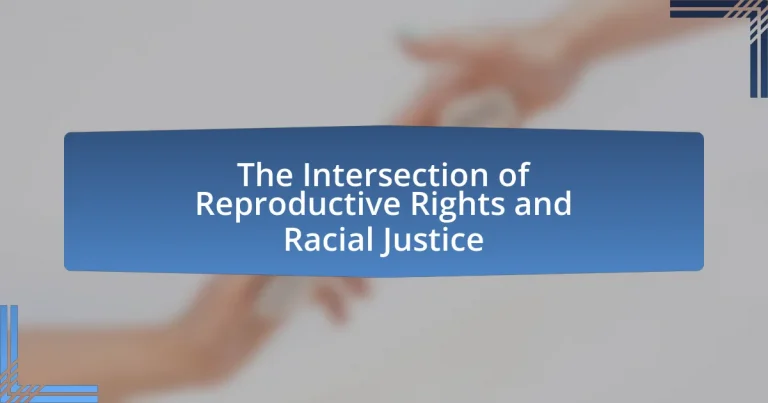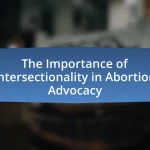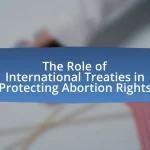The article examines the intersection of reproductive rights and racial justice, highlighting how systemic racism and social inequities affect access to reproductive healthcare for marginalized racial groups, particularly Black and Latina women. It discusses historical contexts, such as the legacy of slavery and eugenics, that have shaped these disparities, as well as the impact of systemic inequalities on healthcare access and maternal health outcomes. Key issues include the criminalization of reproductive choices and the role of policies in perpetuating racial disparities. The article emphasizes the importance of advocacy and education in promoting reproductive justice and addressing the unique challenges faced by women of color in exercising their reproductive rights.
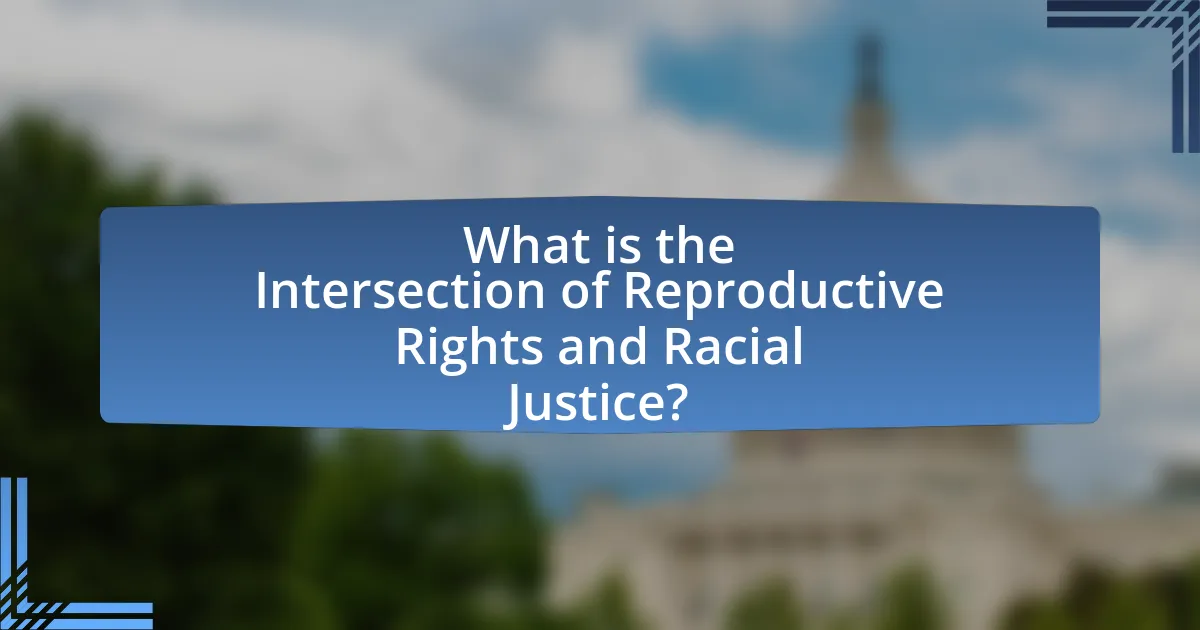
What is the Intersection of Reproductive Rights and Racial Justice?
The intersection of reproductive rights and racial justice refers to the ways in which access to reproductive healthcare and autonomy is influenced by systemic racism and social inequities. Historically, marginalized racial groups, particularly Black and Latina women, have faced significant barriers to accessing reproductive services, including contraception and abortion, due to discriminatory policies and practices. For example, studies show that Black women are more likely to experience unintended pregnancies and have less access to prenatal care compared to their white counterparts, highlighting the disparities rooted in both race and reproductive health. This intersection emphasizes the need for policies that address both reproductive rights and racial equity to ensure that all individuals can exercise their reproductive choices free from discrimination and oppression.
How do reproductive rights relate to racial justice?
Reproductive rights are fundamentally linked to racial justice as they directly impact the autonomy and health of marginalized racial groups. Historically, systemic inequalities have resulted in limited access to reproductive healthcare for people of color, leading to disparities in maternal and infant health outcomes. For instance, Black women in the United States are three to four times more likely to die from pregnancy-related complications than white women, highlighting the intersection of race and reproductive health. Furthermore, policies that restrict reproductive rights often disproportionately affect communities of color, exacerbating existing social and economic inequalities. Thus, ensuring reproductive rights is essential for achieving racial justice, as it empowers individuals to make informed choices about their bodies and families, ultimately contributing to equity in health and social outcomes.
What historical contexts shape the intersection of these rights?
The historical contexts that shape the intersection of reproductive rights and racial justice include the legacy of slavery, eugenics movements, and systemic racism in healthcare. The legacy of slavery in the United States created a framework where Black women’s reproductive autonomy was often disregarded, as they were subjected to forced sterilizations and exploitation. The eugenics movement in the early 20th century further marginalized minority populations by promoting sterilization policies aimed at controlling their reproduction, which disproportionately affected women of color. Additionally, systemic racism in healthcare has led to disparities in access to reproductive health services, as evidenced by studies showing that Black women face higher maternal mortality rates compared to white women. These historical contexts illustrate how reproductive rights cannot be fully understood without considering the racial injustices that have shaped them.
How do systemic inequalities impact access to reproductive rights?
Systemic inequalities significantly hinder access to reproductive rights by creating barriers based on race, socioeconomic status, and geographic location. For instance, marginalized communities often face limited availability of healthcare services, including reproductive health care, due to systemic racism and economic disparities. According to the Guttmacher Institute, Black and Latina women are disproportionately affected by restrictive reproductive policies and lack of access to comprehensive healthcare, leading to higher rates of unintended pregnancies and maternal mortality. Additionally, systemic inequalities manifest in the form of discriminatory practices within healthcare systems, which can deter individuals from seeking necessary reproductive services. These factors collectively illustrate how systemic inequalities directly impact the accessibility and quality of reproductive rights for vulnerable populations.
Why is the intersection important for marginalized communities?
The intersection of reproductive rights and racial justice is crucial for marginalized communities because it addresses the compounded discrimination they face. Marginalized groups, particularly women of color, often experience systemic barriers that limit their access to reproductive healthcare, leading to poorer health outcomes. For instance, studies show that Black women are three to four times more likely to die from pregnancy-related complications than white women, highlighting the urgent need for equitable healthcare access. This intersectional approach ensures that policies consider the unique challenges faced by these communities, promoting social justice and health equity.
What specific challenges do women of color face regarding reproductive rights?
Women of color face significant challenges regarding reproductive rights, including systemic racism, limited access to healthcare, and socioeconomic disparities. Systemic racism manifests in discriminatory practices within healthcare systems, leading to inadequate care and mistrust among women of color. Limited access to healthcare services, particularly in rural or underserved urban areas, restricts their ability to obtain reproductive health services, including contraception and safe abortions. Socioeconomic disparities further exacerbate these issues, as women of color often experience higher rates of poverty, which can hinder their access to necessary reproductive health resources. According to the Guttmacher Institute, women of color are disproportionately affected by restrictive reproductive policies and lack of insurance coverage, highlighting the intersection of race and reproductive rights.
How do cultural perceptions influence reproductive choices in different racial groups?
Cultural perceptions significantly influence reproductive choices among different racial groups by shaping beliefs, values, and practices surrounding family planning and childbearing. For instance, in some communities, cultural norms may prioritize large families, while others may emphasize education and career before starting a family. Research indicates that African American women often face societal pressures that affect their reproductive decisions, such as historical mistrust of medical institutions, which can lead to lower rates of contraceptive use and higher rates of unintended pregnancies. Similarly, Hispanic communities may experience cultural expectations regarding motherhood and family size, impacting their access to reproductive health services. These cultural frameworks not only dictate personal choices but also interact with systemic factors like healthcare access and socioeconomic status, further complicating reproductive outcomes across racial lines.
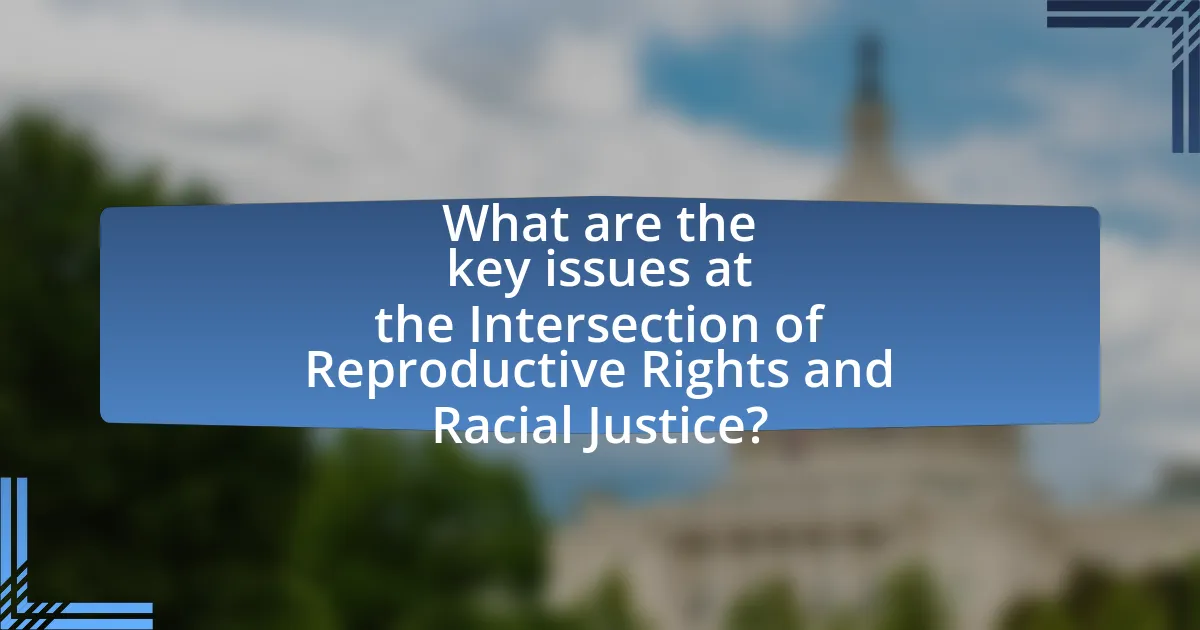
What are the key issues at the Intersection of Reproductive Rights and Racial Justice?
Key issues at the intersection of reproductive rights and racial justice include systemic inequities in access to healthcare, the criminalization of reproductive choices, and the disproportionate impact of restrictive reproductive policies on marginalized communities. For instance, Black women face higher maternal mortality rates, which are linked to inadequate healthcare access and systemic racism within medical institutions. Additionally, policies that limit access to abortion disproportionately affect women of color, as they often lack the financial resources and support systems to navigate these restrictions. Historical context shows that reproductive rights movements have often sidelined the voices of women of color, further exacerbating these disparities.
How do policies affect reproductive rights for racial minorities?
Policies significantly impact reproductive rights for racial minorities by creating barriers to access and perpetuating systemic inequalities. For instance, restrictive laws such as mandatory waiting periods, parental consent requirements, and targeted regulations on abortion providers disproportionately affect communities of color, limiting their ability to make autonomous reproductive choices. Research from the Guttmacher Institute indicates that Black and Latina women face higher rates of unintended pregnancies and maternal mortality, exacerbated by these policies. Furthermore, funding cuts to programs like Title X have reduced access to essential reproductive health services for low-income women, who are often racial minorities. These policies not only restrict access but also reflect broader societal inequities, reinforcing the intersection of reproductive rights and racial justice.
What role do state laws play in shaping access to reproductive healthcare?
State laws significantly influence access to reproductive healthcare by establishing regulations that can either facilitate or restrict services. For instance, laws governing abortion, contraception, and parental consent vary widely across states, leading to disparities in availability and accessibility. According to the Guttmacher Institute, as of 2021, 19 states had enacted laws that severely limit access to abortion, while other states have implemented protective measures to ensure reproductive rights. These legal frameworks directly impact the ability of individuals to obtain necessary healthcare services, often reflecting broader societal attitudes towards reproductive rights and racial justice.
How do federal policies impact racial disparities in reproductive health?
Federal policies significantly impact racial disparities in reproductive health by shaping access to healthcare services, funding for reproductive health programs, and the enforcement of anti-discrimination laws. For instance, the Hyde Amendment restricts federal funding for abortions, disproportionately affecting low-income women of color who rely on Medicaid for healthcare. Additionally, policies like the Affordable Care Act expanded access to contraceptive services, yet racial minorities still face barriers due to systemic inequities in healthcare access and quality. Research indicates that Black and Latina women experience higher rates of maternal mortality, highlighting the urgent need for equitable federal policies that address these disparities.
What are the implications of reproductive health disparities?
Reproductive health disparities lead to significant negative outcomes for marginalized populations, including higher rates of maternal mortality and morbidity. For instance, Black women in the United States are three to four times more likely to die from pregnancy-related complications compared to white women, highlighting systemic inequities in healthcare access and quality. These disparities also result in limited access to contraception and reproductive health services, which can exacerbate socioeconomic inequalities and hinder overall community health. Furthermore, the implications extend to mental health, as individuals facing reproductive health disparities often experience increased stress and anxiety related to their reproductive choices and outcomes.
How do these disparities affect maternal health outcomes among different racial groups?
Disparities in healthcare access and quality significantly affect maternal health outcomes among different racial groups. For instance, Black women in the United States are three to four times more likely to die from pregnancy-related complications compared to white women, largely due to systemic inequities such as lack of access to quality prenatal care, implicit bias in medical treatment, and socioeconomic factors. Research published in the American Journal of Public Health highlights that these disparities are exacerbated by factors like chronic stress from racism, which can lead to adverse pregnancy outcomes. Thus, the intersection of reproductive rights and racial justice is critical in addressing these disparities to improve maternal health outcomes across racial groups.
What are the long-term effects of limited reproductive rights on communities of color?
Limited reproductive rights have significant long-term effects on communities of color, including increased poverty rates, poorer health outcomes, and diminished educational opportunities. These communities often face systemic barriers that restrict access to reproductive healthcare, leading to higher rates of unintended pregnancies and maternal mortality. For instance, studies show that Black women are three to four times more likely to die from pregnancy-related complications than white women, highlighting the disparities in healthcare access and quality. Additionally, limited reproductive rights can perpetuate cycles of poverty, as individuals may lack the ability to make informed choices about family planning, which directly impacts their economic stability and educational attainment. This systemic inequality reinforces social and economic disadvantages, further marginalizing communities of color.
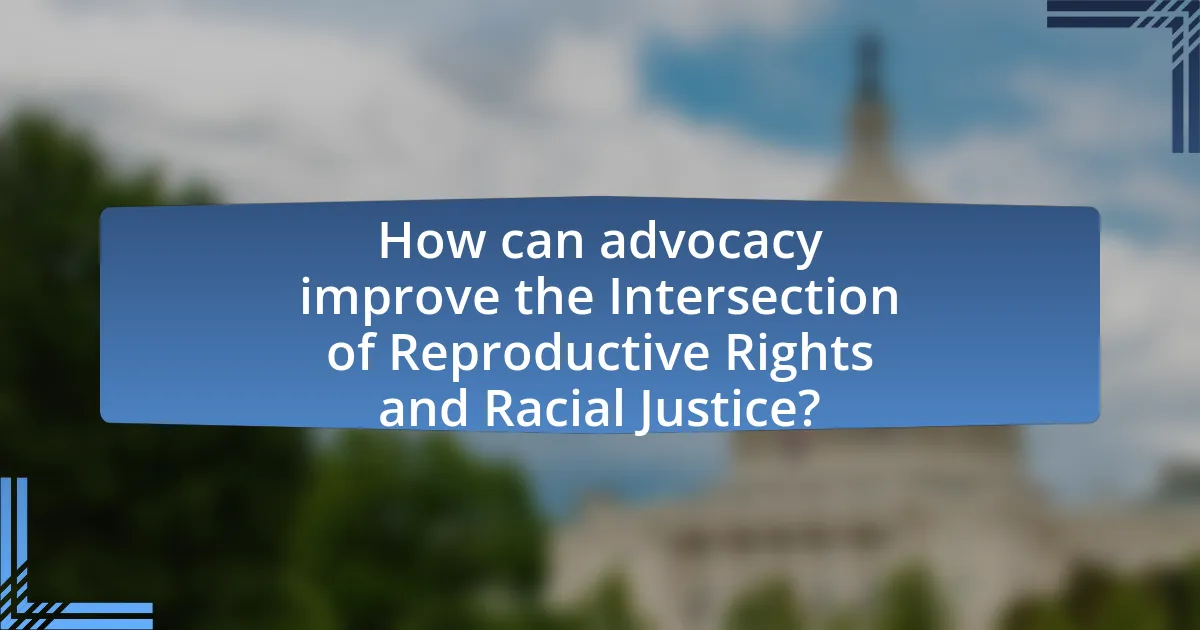
How can advocacy improve the Intersection of Reproductive Rights and Racial Justice?
Advocacy can improve the intersection of reproductive rights and racial justice by amplifying marginalized voices and addressing systemic inequalities. Effective advocacy campaigns can highlight the unique challenges faced by women of color, such as limited access to healthcare services and discriminatory policies that disproportionately affect their reproductive choices. For instance, studies show that Black women are three to four times more likely to die from pregnancy-related complications than white women, underscoring the urgent need for targeted advocacy efforts. By mobilizing communities, influencing policy changes, and promoting equitable access to reproductive healthcare, advocacy can create a more just framework that supports both reproductive rights and racial equity.
What strategies can be employed to promote reproductive justice?
To promote reproductive justice, strategies must include comprehensive education on reproductive health, advocacy for equitable access to healthcare services, and the implementation of policies that address systemic inequalities. Comprehensive education empowers individuals with knowledge about their reproductive rights and options, which is essential for informed decision-making. Advocacy efforts should focus on ensuring that marginalized communities have access to affordable and culturally competent healthcare services, as studies show that disparities in healthcare access significantly impact reproductive outcomes. Additionally, policies that address systemic inequalities, such as those related to race and socioeconomic status, are crucial; for instance, the Guttmacher Institute reports that Black women are disproportionately affected by restrictive reproductive policies, highlighting the need for targeted interventions that promote equity.
How can community organizations support marginalized voices in reproductive rights advocacy?
Community organizations can support marginalized voices in reproductive rights advocacy by actively amplifying their narratives and ensuring representation in decision-making processes. By creating platforms for marginalized individuals to share their experiences, organizations can highlight the unique challenges faced by these communities, such as systemic racism and economic barriers that impact access to reproductive healthcare. Research indicates that inclusive advocacy efforts lead to more comprehensive policy changes, as seen in the work of organizations like the National Latina Institute for Reproductive Justice, which emphasizes the importance of intersectionality in reproductive rights. Furthermore, providing resources, education, and training to marginalized groups empowers them to advocate for their own rights, fostering a more equitable dialogue in reproductive health discussions.
What role does education play in advancing reproductive rights awareness?
Education plays a crucial role in advancing reproductive rights awareness by equipping individuals with knowledge about their rights and available healthcare options. Comprehensive education programs that include information on reproductive health, legal rights, and access to services empower individuals to make informed decisions. Studies show that areas with higher levels of reproductive health education experience lower rates of unintended pregnancies and increased utilization of contraceptive methods, highlighting the effectiveness of education in promoting reproductive autonomy. Furthermore, educational initiatives that address the intersectionality of race and reproductive rights can help dismantle systemic barriers faced by marginalized communities, fostering a more equitable understanding of reproductive health issues.
What are best practices for supporting reproductive rights in the context of racial justice?
Best practices for supporting reproductive rights in the context of racial justice include advocating for equitable access to healthcare services, ensuring comprehensive sex education, and promoting policies that address systemic inequalities. Equitable access to healthcare services is crucial, as studies show that marginalized communities, particularly people of color, face significant barriers to reproductive healthcare, including financial constraints and lack of nearby facilities. Comprehensive sex education empowers individuals with knowledge about their reproductive health, which is essential for informed decision-making. Additionally, policies that address systemic inequalities, such as those highlighted in the 2017 report by the National Women’s Law Center, demonstrate that addressing economic and social disparities is vital for achieving reproductive justice. These practices collectively support the intersection of reproductive rights and racial justice by ensuring that all individuals have the resources and knowledge necessary to make informed choices about their reproductive health.
How can individuals contribute to advocacy efforts for reproductive justice?
Individuals can contribute to advocacy efforts for reproductive justice by engaging in grassroots organizing, educating themselves and others about reproductive rights, and supporting organizations that focus on these issues. Grassroots organizing allows individuals to mobilize their communities, raise awareness, and influence local policies. Education on reproductive rights, including understanding the historical context and current challenges, empowers individuals to advocate effectively. Supporting organizations, such as the National Network of Abortion Funds or Planned Parenthood, through donations or volunteer work helps sustain efforts aimed at achieving reproductive justice. These actions collectively strengthen the movement and promote equitable access to reproductive healthcare for marginalized communities.
What resources are available for those seeking to understand and support this intersection?
Resources available for understanding and supporting the intersection of reproductive rights and racial justice include organizations, literature, and online platforms. Notable organizations such as the Center for Reproductive Rights and the National Black Women’s Reproductive Justice Agenda provide comprehensive information and advocacy tools. Scholarly literature, including “Reproductive Justice: An Introduction” by Loretta Ross and Rickie Solinger, offers critical insights into the historical and social contexts of these issues. Online platforms like the Reproductive Justice Collective provide access to webinars, articles, and community events that foster education and activism. These resources collectively enhance awareness and support for the intersection of reproductive rights and racial justice.
